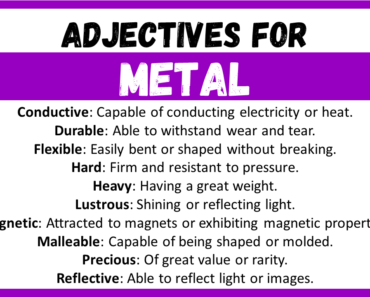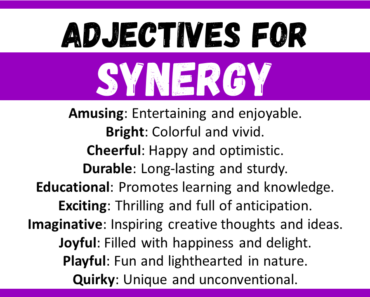Scientists are brilliant minds who explore, study, and unravel the mysteries of the natural world. They are curious individuals driven by a passion for knowledge and understanding. A scientist is someone who utilizes their expertise in a particular field to conduct experiments, analyze data, and draw meaningful conclusions. Words that aptly describe scientists include inquisitive, analytical, meticulous, innovative, and dedicated. These individuals possess an insatiable thirst for discovery and possess the ability to think critically and solve complex problems.
Adjectives for Scientist
Here are the 20 Most Popular adjectives for a scientist:
- Inquisitive
- Analytical
- Meticulous
- Innovative
- Dedicated
- Objective
- Tenacious
- Observant
- Methodical
- Creative
- Logical
- Rational
- Detail-oriented
- Curious
- Persistent
- Resourceful
- Versatile
- Precise
- Skeptical
- Adaptable
Words to Describe Scientist with Meanings
- Inquisitive: Eager to learn and explore.
- Analytical: Skilled in breaking down complex problems.
- Meticulous: Extremely careful and precise in work.
- Innovative: Introducing new ideas and methods.
- Dedicated: Fully committed and devoted to their work.
- Objective: Unbiased and impartial in their approach.
- Tenacious: Persistent and determined in achieving goals.
- Observant: Keenly attentive to details and patterns.
- Methodical: Systematic and organized in their approach.
- Creative: Producing original and imaginative ideas.
- Logical: Applying reason and sound judgment.
- Rational: Based on logical reasoning and evidence.
- Detail-oriented: Focused on small, intricate aspects.
- Curious: Eager to explore and understand new things.
- Persistent: Not giving up easily; determined.
- Resourceful: Able to find clever solutions and alternatives.
- Versatile: Skilled in various areas or fields.
- Precise: Accurate and exact in measurements and descriptions.
- Skeptical: Having a questioning and doubtful mindset.
- Adaptable: Capable of adjusting to different situations.
Example Sentences for Scientist Adjectives
- The inquisitive scientist eagerly pursued new theories.
- Her analytical approach helped solve the complex problem.
- The researcher’s meticulous work ensured accurate results.
- The innovative scientist developed a groundbreaking technology.
- He was a dedicated scientist, working late into the night.
- The experiment was conducted with an objective mindset.
- Despite challenges, she remained tenacious in her research.
- The observant scientist noticed the subtle pattern in data.
- His methodical approach ensured systematic progress in research.
- The artist’s work showcased creative thinking in scientific concepts.
- Her logical reasoning led to a breakthrough discovery.
- The rational scientist based conclusions on empirical evidence.
- The report was thorough and detail-oriented in its findings.
- The curious scientist explored uncharted territories of knowledge.
- The persistent researcher overcame obstacles to achieve success.
- He demonstrated a resourceful approach to problem-solving.
- The versatile scientist excelled in multiple scientific disciplines.
- The measurements were precise down to the smallest decimal.
- The skeptical scientist questioned the validity of the hypothesis.
- In the face of change, she remained adaptable to new methods.
Explore More Words:
FAQ’s
How to describe scientist in writing?
A scientist can be described as an inquisitive and analytical individual who explores and investigates the natural world, employing meticulous methods to uncover knowledge and solutions.
What are the qualities of a good scientist?
Good scientists possess qualities such as curiosity, dedication, objectivity, and a methodical approach. They are creative, logical, and detail-oriented, demonstrating persistence and resourcefulness in their pursuit of scientific understanding.
What is the attitude of a scientist?
The attitude of a scientist is characterized by open-mindedness, skepticism, and a commitment to evidence-based reasoning. They maintain a curious and observant mindset, embracing challenges and approaching their work with objectivity and a willingness to revise hypotheses based on new data.








